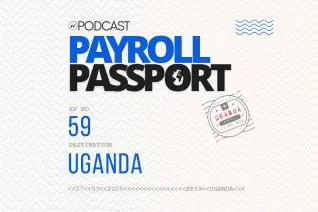Country Spotlight: Payroll in Saudi Arabia

Saudi Arabia is a fascinating country. Saudi Arabia offers everything from expansive deserts covering up to 95% of the country to being home to the world's largest airport and extensive oil reserves. Capital city Riyadh is even ranked 30th on the Global Smart City Ranking for 2022, and the kingdom estimated a whopping GDP of USD 1.733 trillion at the end of last year.
Aren't these enough reasons to do business in Saudi Arabia?
But if you plan to do so, payroll is one of the most critical aspects that must be considered. Payroll in Saudi Arabia can be complex and challenging, especially for foreign companies unfamiliar with the local regulations and practices.
Minimum Wage and Overtime
There is no specified national minimum wage for public sector employees in Saudi Arabia. However, the minimum wage for private sector local employees is 4,000 SAR per month. A Saudization policy also requires private companies to have a certain percentage of their workforce comprised of Saudi nationals.
Saudization is the government’s effort to encourage more local workers in the private sector
The standard working hours are 48 hours per week; any hour beyond that is considered overtime. The working hours may be reduced to 6 hours per day during Ramadan.
Employers must pay overtime at 150% of the employee's average salary rate. The daily working hours cannot exceed 11 hours, and the overtime hours cannot exceed 48 hours per week.
Also read | A Spotlight on Global Payroll Compliance Requirements in the Middle East and African regions
Tax and Social Security
In Saudi Arabia, personal income tax is not levied on employees. However, employers and employees must contribute to the social security system governed by the General Organization for Social Insurance (GOSI).
The social security contributions vary depending on the employee's nationality. For Saudi nationals, employers must contribute 12% towards it, while employees must contribute 10% of their salary. The minimum wage to contribute to social security should be 1,500 SAR per month, and the maximum should be 45,000 SAR per month.
For foreigners, the social security tax is only 1.5% for occupational hazard insurance. The minimum salary for contribution purposes is 400 SAR per month, and the maximum is 45,000 SAR per month. Foreigners do not have to contribute anything from their pay.
Employers must register themselves and their employees with GOSI within two months of starting their business or hiring their first employee. They also must file monthly returns and pay contributions by the end of each month.
Reporting and Filing
Employers in Saudi Arabia must keep updated records of all their payroll activities, such as salaries, wages, bonuses, deductions, contributions, taxes, etc. Employers must report any changes in this data to GOSI within 15 days. They also must report any accidents or injuries at work within three days of the incident.
Employers must file annual returns with GOSI by the end of January each year. They must also file annual returns with the General Authority of Zakat and Tax by the end of March each year. Zakat is a mandatory charity calculated based on the lunar year and payable annually. It is different from taxes.
The Zakat rate in Saudi Arabia is 2.5% of one's net assets, such as investments, business assets, gold, livestock, agricultural produce, etc. Some exemptions and deductions apply to certain assets, and it becomes a crucial responsibility for payroll providers to bear these in mind before delivering pay slips.
You may also like: Country Spotlight: Payroll in UAE
Untangling these intricacies
Understanding all such regulations and remaining compliant can be a challenge for organizations, and it may be hard to ensure payroll accuracy single-handedly.
This is why using a single platform that can integrate with other systems and handle the complexities of payroll is beneficial.
And what better solution than Neeyamo's Global Payroll, which covers every aspect of payroll in 160+ countries?
From collecting and verifying inputs through a reliable compliance framework to delivering accurate and timely outputs through a single global payroll engine, businesses can process their payroll in Saudi Arabia and several other countries in a matter of minutes!
Reach out to the experts today.
Latest Resources
Stay informed with latest updates
If you're curious and have a thirst for knowledge pertaining to the HR, payroll, and EOR universe, don't miss out on subscribing to our resources.
















